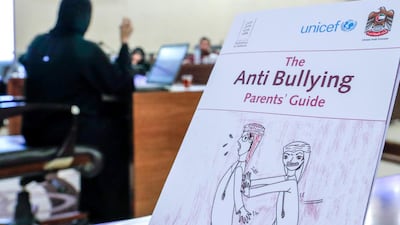Bullying in schools can often be traced back to the behaviour of parents, a top judicial official said, as she urged families to think twice about the language they use and how they treat their children.
Shouting, showing anger and leaving children to play violent video games are all factors that can make children become bullies themselves, said Alia Al Kaabi, head of Family and Child Prosecution at the Abu Dhabi Judicial Department.
Some parents seem ignorant to the impact they could be having on their children's development, she said.
“The family is considered the first environment that affects a child’s behaviour,” she said.
"If a child is bullied inside his home, they will become aggressive in school by reflecting the violence they learnt at home.
"Those who live in an environment where their parents are always yelling tend to imitate that behaviour and be aggressive towards others."
At least one in four 15-year-olds in the UAE reported being bullied “at least a few times a month,” according to the 2017 OECD Programme for International Student Assessment’s Students’ Well-Being report. It studied 72 countries and found the UAE had the eighth-highest prevalence of bullying.
Last year, the Dubai Student Well-being Census found that while a majority of children enjoyed a good school experience, some 23 per cent of nearly 65,000 Grade 6 to 9 pupils at 168 schools did not feel safe in the classroom.
At the same time, parents who are too harsh with their children often leave them ill-equipped to deal with the realities of growing up.
"Criticising the child directly and ridiculing, them repeatedly will weaken their self-confidence and they will become an easy victim for bullies," said Ms Al Kaabi, who said her department has never seen a case serious enough for prosecution, but hopes to generate awareness about the impact bullying can have.
Al Kaabi said there is a “golden rule” that she urges all parents to teach their children which is to “treat people as you like to be treated. Ask your children if they would like to bullied,” she said.
Changes in mood, becoming withdrawn, and showing reluctance to go in to school are among the well-established signs a child may be being picked on at school.
But experts warn parents and teachers that signs can be more subtle on alert for signs of bullying, and urge them to keep an eye on children's activity online.
Parents should also not make excuses for their children if they are aggressive towards others, she said.
“Especially in the presence of teachers and peers," Ms Al Kaabi said.
"However, in case the child is the victim, parents must inform the school and start to teach the child how to defend him or herself and at the same time to alert school authorities.”
Rashmi Nandkeolyar, principal of Delhi Private school in Dubai, said that bullying is best dealt with by teachers and parents together.
She said that "a sensible motherly talk usually does the trick, and we normally sort it out at the school level,", but that any serious incidents are reported to the education authorities.
"We also use our student council to help monitor and intervene," she said.
She said the school has even used its morning radio show to allow the issue to be discussed openly and ensure pupils know it is taken seriously.


